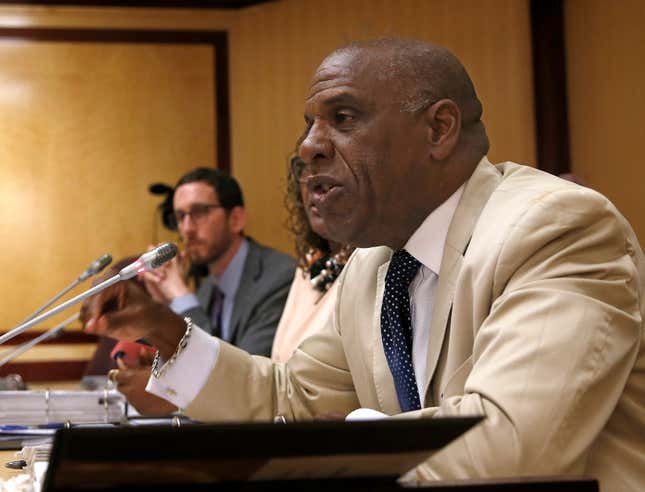
On Wednesday, California lawmakers moved forward legislation that can cause law enforcement officers to lose their badges. The legislation is awaiting a signature from Gov. Gavin Newsom, who has been in favor of police reform in the past.
According to the Associated Press, the Kenneth Ross Jr. Police Decertification Act, a bill originally introduced a year ago by Democratic state Sen. Steven Bradford, aims to stop officers from simply changing departments after they have been found guilty of misconduct. The bill will create a new certification that can be permanently revoked by an 18-member council called the Commission on Peace Officer Standards and Training.
Among the serious misconduct issues that the bill names are “using excessive force, sexual assault, intimidating witnesses, making a false arrest or report, or participating in a law enforcement gang. Other grounds include “demonstrating bias” based on race, religion, gender identity, sexual orientation or mental disability, among other criteria,” AP reports.
Bradford named the bill after 25-year-old Kenneth Ross, a Black man killed by an officer in Los Angeles County back in 2018. According to AP, the officer was cleared of wrongdoing in Ross’ case but was previously involved in three other shootings.
Last Friday, KTLA reported that opponents fear the bill may be too vague and the commission may have too much power. A new disciplinary board would only have two of the nine members representing police, while the other seven would have backgrounds related to police accountability. Sen. Bradford was forced to soften the bill.
From KTLA:
He initially proposed that four of the advisory board members have backgrounds related to “police misconduct” before changing the wording to ”police accountability.” And instead of requiring that two members be victims or family members, the bill now requires strong consideration for including those representatives.
Another Assembly amendment requires a two-thirds vote to decertify an officer, and that officials must have clear and convincing evidence of wrongdoing.
The measure initially would have required the commission to adopt the advisory board’s recommendation. It now requires the commission to “review” the advisory board’s recommendation and refer any action against an officer to a newly created Peace Officer Standards Accountability Division for proceedings that comply with normal due process rules.
Additional Assembly amendments allow the commission to suspend an officer’s license as a lesser alternative to de-certifying the officer; clarify what constitutes serious misconduct; require 40 hours of decertification training for board members; and make it clear that officers retain their constitutional rights, including to free speech.
KTLA also notes that other amendments include allowing the commission to either review internal investigations done by law enforcement agencies under the amended bill or choose to conduct its own investigation, as well as softened limits on police immunity from being sued for civil rights abuses.
The bill was killed by the state legislature last summer despite the nationwide protests calling for police reform. AP notes that California, Hawaii, New Jersey and Rhode Island are the only states without a way of decertifying officers.
It has now passed in the Senate on a 28-9 vote, with Republicans opposed. The measure is a part of a larger effort to pass more criminal justice reform legislation in the state. Gov. Newsom is expected to see at least three related bills at the same time.
From AP:
Also Wednesday, the Assembly sent Newsom several related bills, including one setting statewide standards for law enforcement’s use of rubber bullets and chemical irritants during protests. A similar bill also died last year.
Another prohibits law enforcement gangs and makes participation grounds for dismissal. The bill defines such gangs as a group of officers that engages in a pattern of unlawful or unethical on-duty behavior and who may identify themselves by a name and may have matching tattoos or other identifying symbols.
A third limits street gang enhancements to the most serious offenses, in keeping with a recommendation by a governor’s advisory committee.
“This bill allows them to rid the bad apples that we know exist, bad apples that we know exist in every profession,” Bradford said, according to AP. “Just because you put on a uniform and a badge doesn’t absolve you or make you immune to being a bad person.”



